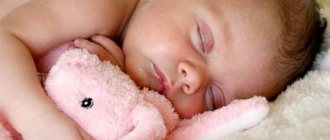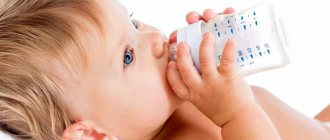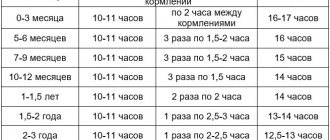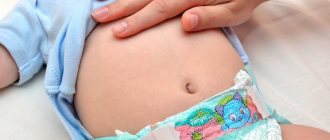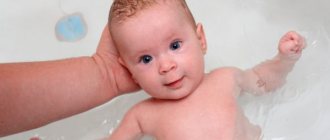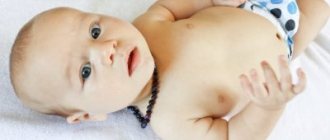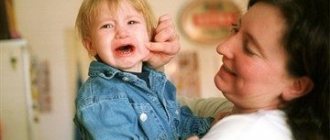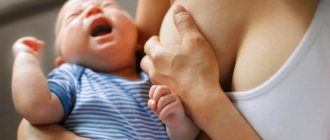0
10597
For loving parents, nothing is more important than a happy and healthy child. However, in our time of poor quality food, poor ecology, sedentary, but at the same time accelerated pace of life, there is hardly a person who would not get sick at least once in his life. Moreover, according to statistics, children get sick much more often than adults. This is due to various factors, but the main significance is the fact that children under six years of age have not yet developed immunity. Therefore, mothers and fathers should be attentive to their child, paying attention to all unusual signals.
One of the alarming manifestations is the increased production of secretion from the sweat glands at night. Of course, this phenomenon can be caused by various factors. However, there is a possibility that it is a symptom of pathological processes in the body. Why does a child sweat while sleeping, and which doctor should he contact?
Sweat secretion mechanism
Sweating is an integral process in the functioning of our body. It is thanks to the work of the sweat glands that thermoregulation is carried out. In addition, this phenomenon helps remove waste and toxins from the body, participates in the acid-salt balance and performs a barrier function, protecting the body from bacteria entering it through the skin. The secretion of fluid through the skin is carried out by two types of sweat glands. We are talking about eccrine and apocrine elements.
Types of glands responsible for sweat excretion:
- Apocrine glands are present on the human body from birth. They are quite large and located only in certain areas. The functions of these elements are still not fully understood. However, it is known that such glands secrete pheromones and begin to work during puberty.
- Eccrine glands are also present in every person from birth. These elements are small in size and cover the entire body. However, there are areas where their concentration is especially high. It is these glands that are responsible for thermoregulation, and also participate in acid-base metabolism, protecting the body from bacteria and removing toxins.
Typically, sweating occurs precisely due to the increased activity of the eccrine glands. However, in some cases, this problem becomes a consequence of failures in the apocrine system.
A child has a sweaty head in a dream: how to explain it
The opinion of pediatricians on the issue is this: on average, every tenth pair of parents is faced with the fact that their child’s head sweats during sleep. In most cases, there is no cause for concern, since a baby's sweat glands are formed before 4-6 years of age.
Imperfect thermoregulation is another reason why sweating occurs. Unlike adults, the process is largely carried out by the lungs, not the skin. Therefore, if the air is excessively dry or there are diseases of the upper respiratory tract, the child will sweat.
Attention! The functioning of the sweat glands depends on many parameters: thin and sedentary children sweat less, but troubled, emotional, frisky children sweat more. The atmosphere and microclimate also have an impact.
Signs of excessive sweating of the head
Excessive sweat production is called hyperhidrosis. Both parents of young children and adults encounter this phenomenon. Newborn babies do not sweat, but there are a number of signs indicating the development of the disease:
- wet clothes that have to be changed several times during the day;
- profusely wet head after minimally active games;
- wet bed linen.
Hyperhidrosis always manifests itself as poor sleep, decreased appetite, tearfulness, and high nervous excitability. In young children, the phenomenon can be controlled by changes in lifestyle, nutrition, and hygiene. But in some cases, high scalp humidity indicates serious problems.
Let's understand the reasons
There are two types of hyperhidrosis. The primary form is a phenomenon of heredity. If there are people in the family who sweat, the baby will also experience increased gland function. In infancy, these are the head, armpits, then the feet, palms. During puberty, symptoms worsen.
The secondary form is a consequence of the disease. In this case, the child sweats a lot at night, especially the head, but sweat is also released throughout the body.
Sweating as normal
To determine the norm, a test is performed in the hospital. A sweat chloride test will show the following results:
| Patient age | Norm |
| 0 months – 2 years | Below 40 mmol/l |
| From 0 months upon re-test (after the first positive result) | Below 60 mmol/l |
| 3-12 years | Below 40 mmol/l |
| 3-12 years with repeated tests (after the first positive result) | Below 60 mmol/l |
The given standards are average and cannot serve as an evidence base in each particular case.
It is important to know! To establish the disease, children undergo at least 3 tests, after which a specialist confirms or refutes the diagnosis. If the sweat concentration in all three cases is more than 60-70 mmol/l, the baby is sick. If at least one test shows parameters below normal, the patient is considered healthy.
Hyperhidrosis as a sign of pathology, associated symptoms
Having understood the factors of the phenomenon, we will find out why hyperhidrosis is dangerous. If you notice that your child's head sweats a lot when he falls asleep, it's important to look for a number of other symptoms. It is additional signs that will indicate the possible development of diseases.
- Rickets. It affects babies up to one year old, when the growth process occurs at a particularly intensive pace. The reason is a lack of calcium and phosphorus. Most often, premature babies and bottle-fed children suffer from rickets. The disease can be caused by malabsorption syndrome in the intestines as a consequence of lactose deficiency. Other causes of rickets: problems with the kidneys, liver, hereditary predisposition, intestinal infection. Additional symptoms:
- lack of appetite;
- disturbing sleep;
- baldness of the occipital region.
Symptoms are more obvious until the child is one year old. The baby sweats so much that he scratches the back of his head until skin crusts appear.
- Endocrine pathologies. If sweating appears only in the head area with dryness of all skin, this may indicate the onset of diabetes mellitus. Additional signs:
- excessive sweating at rest and with the slightest movements, emotional excitement;
- severe or constant thirst;
- frequent urination;
- general weakness;
- high fatigue.
In addition to diabetes, signs may indicate problems with the thyroid gland.
- Infections. Perhaps the most common cause of sweating. The list of diseases is extensive: ARVI, influenza, intestinal pathologies. The baby sleeps poorly, eats little, and is not active enough. If the respiratory tract is affected, the child breathes heavily, wheezes, and a stuffy nose prevents him from sleeping. This makes the baby capricious and cry. The problem can be solved with proper treatment selected by a pediatrician.
- Cardiovascular diseases. Pathologies are manifested by heavy breathing, coughing, weight loss, cyanosis of the nasolabial triangle and high fatigue.
Intestinal infections can provoke a phenomenon such as vomiting. It differs from infant belching in the presence of mucus. And with sweating, which is accompanied by grinding of teeth or gums, a parasitic infection can be suspected.
Hyperhidrosis may indicate problems with the autonomic nervous system. In babies under one year old, their functions are still developing, so the head sweats a lot, but the body remains dry. If the doctor does not see the disease, and as soon as the baby begins to fall asleep, humidity appears, monitor the baby’s behavior and emotions during the day. Excessive nervous shock is harmful here, but there is a positive point - the phenomenon goes away with age.
Sweating of the head at different ages: features of the syndrome
It is necessary to distinguish why a child's head sweats during sleep, depending on the days, months and years of age. Until the period of formation of the functions of the nervous system, metabolic and hormonal processes, excessive sweating should not be alarming in the following cases:
- the baby is normally active during the day;
- the child has strong emotions, especially under the age of 1 year;
- there are no signs of loss of appetite, belching is normal;
- daytime sleep does not cause difficulties with falling asleep or waking up;
- night rest is regular, without signs of apnea;
- the child does not have an infectious lesion.
In this case, parents can consult a doctor and, for preventive purposes, take tests to determine the child’s sweating rate. In addition, each age has its own characteristics of sweating.
From birth to one year
During this period, teething and neurological disorders are added to the previously listed causes of sweating. Parents often notice that the baby develops cold sweat in the chest area. It can also cover the forehead, temples, and the neck sweats. If the phenomenon is infrequent, then there is nothing to worry about - children adapt to the outside world, but the constant presence of the sign indicates the onset or development of pathology.
The child is two years old
The baby becomes more active, begins to walk and run. In a dream, the body “reboots”, experiencing emotions, which is why a sweaty forehead, back, and legs appear. The peculiarity of this period is that such sweating should not interfere with sleep. But if a child at two years old cannot fall asleep due to excessive sweating, wakes up and asks for a drink - perhaps the reason is diabetes.
It is important to know! A characteristic sign of diabetes is excessive sweating of the upper body with absolute dryness of the lower body.
Three year old baby
Here you can suspect lymphatic diathesis. The main additional symptom is rashes all over the body. Treatment is symptomatic, pediatricians successfully solve this problem. The disease occurs due to the baby’s accelerated adaptation to the outside world.
Also, at three years old, children lead an active life, visit crowded places, go to kindergarten, so infectious lesions cannot be ruled out. Associated symptoms: severe cough, when falling asleep the baby begins to breathe heavily, indigestion and whims appear. Everything suggests that the child’s body is fighting the disease.
The third year of life is the stage of formation and normalization of the sweat and thyroid glands. This is a kind of “turning point” age that completes the formation of primary life support systems. It goes away by the age of 4-5, when the child’s immunity begins to work in full force.
Advice! If at the age of 3 the baby sweats excessively, especially at night, it is necessary to be examined for heart problems.
Is excessive sweating normal in children?
It is a scientifically proven fact that children sweat more than adults. This feature of the young body is explained by several factors. Why children sweat more often than adults:
- A child's sweat glands are formed before the age of five. Moreover, in the first thirty days after birth, a little person’s thermoregulation usually “does not work.” This is one of the factors causing increased sweating in children compared to adults;
- Children have more endocrine glands than adults. This is another factor that explains increased sweating;
- Kids lead a more active lifestyle. Physical activity causes the sweat glands to secrete more secretions.
It is because of these factors that it is normal for children to sweat more than adults. At the same time, babies have more delicate skin, so they often suffer from sweating. Increased sweat production in children in hot weather and in a state of emotional, mental, and physical activity is considered normal. However, if a child sweats in his sleep under favorable external factors, then this is a serious reason to think about his health.
It is worth noting that hyperhidrosis at night is a symptom of many serious diseases. Therefore, if a child constantly sweats when falling asleep, then this is a really serious reason to go to the doctor.
How to solve a problem
We looked at the causes of excessive sweating. Now, talk to your doctor about why your one-month baby is suffering. If the problem arose due to a disease of systems or organs, begin treating the baby under the constant supervision of a pediatrician. If a child suffers from hyperhidrosis as a primary disease, you will have to undergo many tests, visit different specialists, and prepare for long-term treatment. Or leave the baby alone in the hope that he will outgrow it.
It is useful for parents to know that some children sweat quite a lot almost before school. In children, the formation and development of the body occurs until adolescence, when sweating intensifies again.
But you can take some steps to alleviate your baby’s condition today. Let's look at the situation from different angles, perhaps you can quickly help your child cope with an unpleasant problem.
- If the reasons are overheating, wrapping, tight swaddling, then treatment is in your hands. Stop overheating your baby, he will stop sweating.
- Dress your baby in clothes made from natural or viscose fabrics that have good hygroscopicity. Do not wrap or swaddle tightly, let the child feel free, unconstrained, unpressured. Carry out hygiene procedures, bathe your baby every day. As recommended by your doctor, use powders and practice rubbing.
- When a nursing mother reviews her diet and eliminates spicy, strong, and too hot foods, the baby will feel better. Theobromine and caffeine, which are found in tea, coffee, chocolate, cocoa, and Coca-Cola, enhance sweating.
- Observe the baby, make a list for the doctor to make a more accurate diagnosis. Write and tell your doctor when, at what time, in what places the sweating is strongest. For example, a wet head at night or sweaty feet after a walk. Collect all the factors of the newborn’s health and development: does he eat with appetite, does he fall asleep quickly, does he sleep soundly. Remember how often he gets sick, catches a cold, and is capricious. All this will help the doctor identify the causes and prescribe treatment.
Causes of sweating in children
You need to understand that the reasons that a child intensively produces sweat during sleep are not always associated with internal pathologies. This may be the result of completely harmless influences. Superficial factors often cause such sweating. In this case, to eliminate the problem, you only need to identify the negative impact and eliminate it.
However, nocturnal hyperhidrosis can also be caused by various serious illnesses. Many of them in the initial stages manifest themselves only by increased sweating.
Sweating as a way to protect the body
Sweating is one of the ways the body protects itself from harmful influences. With its help, processes occur that help the immune system cope with diseases. First of all, I would like to consider why a child sweats so much in his sleep when he has colds.
The fact is that under the influence of pathogenic bacteria and viruses, immune cells begin to influence the hypothalamus.
This leads to an increase in body temperature. Thanks to this, the development of bacteria stops, and immune processes and phagocytosis are activated. When the body begins to cope with the disease, it is faced with the task of increasing the temperature, so the glands begin to actively secrete sweat. Thanks to this, thermoregulation occurs.
Increased sweating is characteristic not only with a natural decrease in temperature. This process also occurs when using antipyretics. If a child sweats while sleeping in the first two weeks after illness, then this is also considered normal. After all, when pathogenic microorganisms are destroyed, harmful toxins remain. And the body gets rid of them through increased separation of various fluids, including sweat.
Alarming symptoms
Mom and dad whose child is subject to heavy sweating during sleep should make sure that he does not have the following symptoms:
- Sweating accompanies intestinal obstruction;
- The child is easily excitable and anxious, he is frightened even by familiar noises and lighting;
- When the little one is sleeping, he begins to tremble, “twitching” with his whole body”;
- The baby has rubbed a bald spot on the back of his head due to sweating of the head;
- Sweat has an acrid consistency and does not smell very pleasant. Irritation or itching is observed on the skin.
The child's most intense sweating occurs at the moment of falling asleep and when he falls asleep, but not during the day.
The factors that led to the toddler sweating when falling asleep may be safe. For example, if the baby sweated during feeding, making every effort to get enough, or because of the uncomfortable temperature in his room.
However, if your loved ones notice the manifestations listed above in their child, then it is worth taking immediate action, be sure to go with your child to an appointment with a specialist.
The most common causes for babies
It is a fact that infants are more prone to sweating than teenagers or adults. However, if a baby sweats a lot without any accompanying factors, then it is likely that this phenomenon is caused by a pathological process present in the body. Sweating during sleep is a symptom of a variety of diseases. However, there are several negative influences that often cause hyperhidrosis at night in infants.
Why does an infant sweat heavily at night while sleeping:
- One of the most common causes for children is rickets. This pathology occurs when there is a lack of vitamin D and causes serious problems with the structures of the musculoskeletal system, as well as with some other organs. At the moment, to prevent this disease, doctors prescribe vitamin D3 to almost all children.
- Premature babies also sweat more than babies born at term. This is due to the fact that such babies have even more undeveloped sweat glands.
- With artificial feeding, increased sweating is also often present. This is due to the composition of the mixture and the fact that such children do not receive nutrients and microbodies in sufficient quantities. Also, “artificial” people are prone to overeating, which can also be a cause of sweating.
Tips and tricks
Every now and then in infants, hyperhidrosis is accompanied by prickly heat. To prevent the appearance of skin rashes, daily bathing of the baby with the addition of a pale pink solution of potassium permanganate is required.
Folk remedies
In the arsenal of traditional medicine there are many recipes that will help get rid of excessive sweating in infants.
Baths
Help if your child is sweating:
- Herbal decoctions of calendula and string, chamomile and yarrow. Brew 1 tbsp. l. raw materials and are used to treat sweaty areas: legs, neck, back of the head. Also injected into the bath.
- Birch buds and oak bark. These are tried and true remedies for sweating in babies.
- Soda baths. Dissolve 2-3 tbsp in water. l. soda before bathing your child.
- Laundry soap. It is used to wash the baby, primarily in the folds of the legs and arms.
Why do teenagers sweat?
Teenagers are also prone to sweating. This is explained by hormonal changes that occur during growing up. During puberty, a variety of processes occur inside a child. This is what leads to increased sweating.
Causes of hyperhidrosis during sleep during puberty:
- One of the reasons is the beginning of the functioning of the apocrine glands. At this age, they begin to work, secreting a fairly large amount of sweat at first;
- Also, a similar problem appears due to hormonal instability. Such disruptions lead to increased sweating;
- Another reason why teenagers sweat at night is constant stress and excitability of the nervous system. This is also associated with hormonal imbalances.
Increased production of sweat secretions at night does not always occur in adolescents. However, if hyperhidrosis is still present, it is often not a sign of the disease. Over time, this condition goes away on its own.
Which doctor to choose
If your babies, in addition to excessive sweating, are characterized by poor appetite, sudden mood swings and some symptoms of developmental delay, then you should immediately contact your pediatrician. Only a specialist can accurately determine whether a child is sick, and, most importantly, what exactly is sick. Treatment prescribed by a doctor can protect your baby from more serious health problems.
In addition, you should visit an endocrinologist, cardiologist and neurologist. This will help determine whether excessive sweating during sleep is a primary sign of various types of anomalies, such as dystonia, malfunctions of the endocrine glands and the cardiovascular system. Your doctor may be able to give you referrals to these specialists.
If sweating is age-related, then after a while the body will return to normal, and all the troubles will disappear.
The pediatrician, having examined the child, can advise parents to more carefully monitor the physical and nervous stress of the baby. To relieve existing fatigue, medications that support your child’s immune system and vitamins, if required, will be prescribed.
Diseases that cause night sweats
Unfortunately, sweating is not always harmless. Manifestations of hyperhidrosis at night can be triggered by a number of serious diseases. Therefore, if this condition lasts long enough, you need to consult a doctor.
Why does a child sweat a lot when sleeping?
- One of the possible diseases that cause nocturnal hyperhidrosis is hyperthermia. This pathology is inherited and represents violations of thermoregulation;
- There is also primary hyperthermia. This is a congenital disease that is expressed by excessive sweating;
- Improper functioning of the endocrine system can also give such a symptom. For example, one of the diseases that contribute to sweating is a disorder of the thyroid gland;
- Also, some genetic diseases can cause excessive sweating. For example, phenylketonuria leads to this;
- Central nervous system disorders cause night sweats;
- Various diseases of viral and bacterial etiology can cause nocturnal hyperhidrosis. For example, dysentery contributes to this condition;
- Worm infestation also causes increased sweating at night. Other parasites can also cause a similar problem;
- Various diseases of the heart and blood vessels can lead to secondary hyperhidrosis. For example, this condition is typical for children suffering from heart failure;
- Tumor processes can also lead to sweating. Moreover, this applies to benign and malignant tumors;
- In case of poisoning, one of the symptoms is increased sweating.
The most dangerous diseases that cause sweating and their symptoms
Some diseases that manifest as excessive sweating are life-threatening. Moreover, they are most effectively treated precisely at the initial stages of their progression. Therefore, it is very important to know their symptoms.
The most dangerous diseases that cause sweating include diseases such as cancer, tuberculosis, sarcoidosis, pneumonia, etc. Some genetic pathologies that worsen the quality of life are also dangerous.
If such diseases are ignored for a long time, the patient’s condition worsens greatly. This ultimately leads to death. Therefore, it is very important to recognize them in time. There are several symptoms that are characteristic of secondary hyperhidrosis caused by disease.
Symptoms associated with sweating in serious diseases:
- Increased body temperature;
- Headache;
- Dizziness;
- Nausea and vomiting;
- Irritability;
- Decreased appetite;
- Sleep disturbance;
- Painful sensations.
If you have such symptoms, you should immediately consult a doctor. This will increase the chances of successful treatment.
External factors causing sweating
Hyperhidrosis at night can cause not only serious diseases. Sometimes external factors lead to this problem. In this case, dealing with the problem will not be difficult. It is enough just to eliminate the negative factor.
Why does a child sweat excessively when falling asleep:
- One of the possible reasons is not the optimal temperature in the room. If this indicator exceeds 19-20 degrees, then sweating will be quite natural. Excessive dryness of the room can also lead to this;
- A child's sweating may occur as a result of dressing inappropriately for the season. Wearing synthetic pajamas and using synthetic bedding also leads to this problem;
- You should not ignore such a factor as poor nutrition. At the same time, overeating, improper selection of diet, and eating food immediately before bedtime can lead to hyperhidrosis;
- Poor personal hygiene can also lead to sweating;
- Nightmares and vivid dreams are another common cause of night sweats in children;
- Nervous disorders and stress can lead to night sweats.
What to do to reduce sweating
Before calling a doctor, you should exclude external factors that provoke increased sweating in the newborn. If your baby’s back, head, arms, or all of them are sweating, you should create comfortable conditions for the baby to sleep and rest.
Room temperature
The best air temperature in the room where the baby is is 18-20 degrees. With this, children sleep better, are more awake, and get sick less. During the heating season, it is important to regulate the heating so that the child does not overheat. Place the thermometer at the level of the crib.
Air humidity
Relative humidity should be 50-70%. You should use a humidifier or hang wet terry towels. An aquarium wouldn't hurt in a children's room either. Frequent wet cleaning is important. With normal humidity, the child’s mucous membranes will not dry out, breathing will become full, sweating will decrease or stop altogether.
Fresh air
Ventilation of the room in summer and winter is necessary for children even more than for adults. The baby will fall asleep better and sleep more peacefully and longer. After sleep, the windows should also be opened. You need to spend enough time walking in the fresh air with your child.
Lingerie
A complete taboo on synthetic fabrics. This applies to bed linen and children's clothing. Only natural material, white or plain, without caustic dyes. Shades of linen are preferable to pastel ones - they soothe infants. Synthetics are not suitable for blankets either. And babies don’t need a pillow at all.
Clothes should be “weather appropriate.” In summer, you don't need warm, fleece pajamas. Vests, bodysuits, and overalls should be loose so that they do not squeeze or rub the baby’s skin.
Water treatments
It is strictly necessary to bathe your child before bedtime, preferably in cool water, starting at +32, and gradually increasing to +27 degrees. Such bathing can relieve the baby from sweating in a couple of months. In summer you can bathe twice a day.
Less impressions before bed
If the child is very mobile and excitable, it is necessary to limit him to strong impressions before bedtime. Turn off the TV, dim the lights. A light massage and a walk will work well. It is worth occasionally practicing baths with decoctions of motherwort, oregano, and mint.
Feeding
The baby should be fed in a ventilated area. There is no need to cover the baby's head at this time. He has some serious work ahead of him, and the uncovered head will prevent the temperature from rising. Offer your child clean water occasionally to help prevent dehydration.
When to visit a doctor
Children are the most susceptible to various negative factors, so it is very important to detect and eliminate them in time. Thus, it would be completely useful to visit a doctor if the child sweats a lot during sleep, but there are no accompanying symptoms.
However, there are some factors that indicate that it is simply necessary to contact a pediatrician. These include: constant sweating at night, the presence of other suspicious manifestations, and the absence of external negative influences.
Who to contact
If a child is sweating, then, first of all, it is necessary to contact a pediatrician. In this case it is a pediatrician. The specialist will examine the little patient. If any problems are identified, he will be prescribed a test for the biochemical and general composition of blood and urine. Based on these data, the doctor will be able to judge the condition of the body. Having received the results of the analysis and performed an examination, the pediatrician will be able to refer the child to a specialist. He may also be assigned variations of instrumental research. After this, an accurate diagnosis will be made.
Increased sweating with rickets
Why does a baby sweat while sleeping? Sometimes this happens if the baby gets rickets. This is a pathological deficiency of vitamin D in the children's body, which leads to serious degenerative processes.
Rickets can be congenital or acquired. Its causes may be associated with pathologies of intrauterine development of the fetus, incorrectly selected method of artificial feeding, lack of physical activity and walks in direct sunlight.
The presence of this disease, which all parents are terrified of, can be determined by the following additional symptoms:
- The child sweats not only in the head area, but also in other parts of the body - perspiration appears on the arms, legs or back.
- The baby sweats before bedtime, as well as during the night and daytime rest.
- Children sweat while sleeping, feeding or being awake.
- Bald spots appear on the back of the baby's head, and he gradually begins to go bald.
- The edges of the fontanel begin to soften, which indicates pathologies of the skeletal system in the child.
- The arms and legs of a sweating newborn become deformed and take on an unnatural position.
A child who exhibits the first symptoms of rickets needs immediate medical attention.
Any delay can have the most dire consequences for the child’s body - from pathological deformations of the bone apparatus to significant delays in mental development.
Treatment of nocturnal hyperhidrosis
Treatments for night sweats are chosen depending on the cause of the problem. In this case, only a pediatrician can choose therapy. Children are usually prescribed drug therapy. For example, in case of helminthic infestation, antihelminthic drugs and a number of other drugs are prescribed. Antibiotics are used for pneumonia. Thus, each disease has its own medicines.
